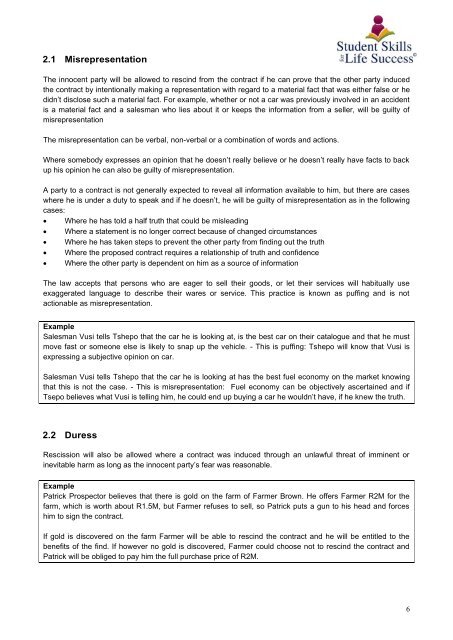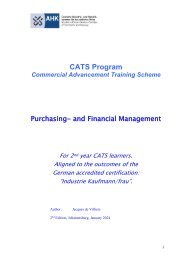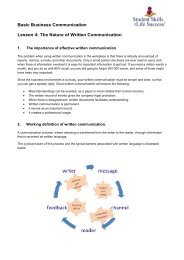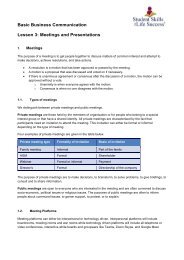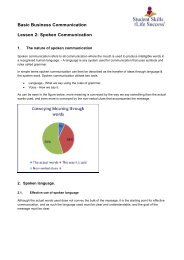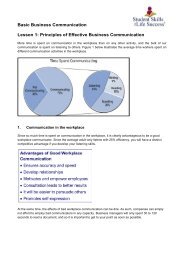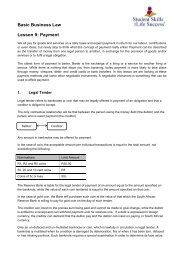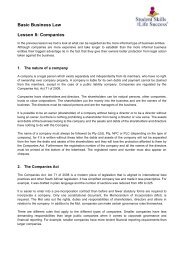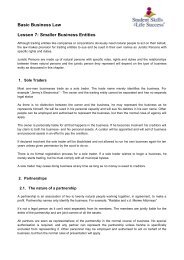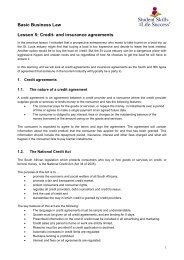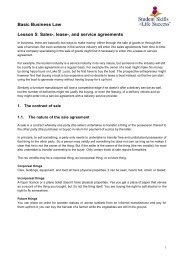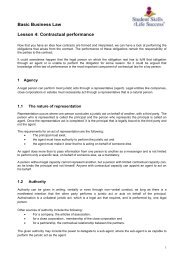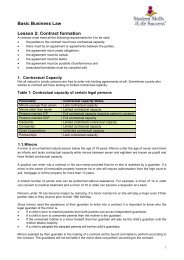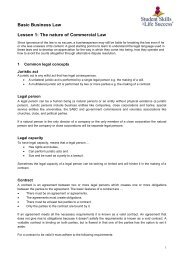Basic Business Law. Lesson 3. Contract Interpretation
This is the third lesson of the "Student Skills for Life Success" "Basic Business Law" course. The topics covered in this booklet are: 1. The contents of the contract 2. Voidable contract 3. Available remedies
This is the third lesson of the "Student Skills for Life Success" "Basic Business Law" course. The topics covered in this booklet are:
1. The contents of the contract
2. Voidable contract
3. Available remedies
Create successful ePaper yourself
Turn your PDF publications into a flip-book with our unique Google optimized e-Paper software.
2.1 Misrepresentation<br />
The innocent party will be allowed to rescind from the contract if he can prove that the other party induced<br />
the contract by intentionally making a representation with regard to a material fact that was either false or he<br />
didn’t disclose such a material fact. For example, whether or not a car was previously involved in an accident<br />
is a material fact and a salesman who lies about it or keeps the information from a seller, will be guilty of<br />
misrepresentation<br />
The misrepresentation can be verbal, non-verbal or a combination of words and actions.<br />
Where somebody expresses an opinion that he doesn’t really believe or he doesn’t really have facts to back<br />
up his opinion he can also be guilty of misrepresentation.<br />
A party to a contract is not generally expected to reveal all information available to him, but there are cases<br />
where he is under a duty to speak and if he doesn’t, he will be guilty of misrepresentation as in the following<br />
cases:<br />
• Where he has told a half truth that could be misleading<br />
• Where a statement is no longer correct because of changed circumstances<br />
• Where he has taken steps to prevent the other party from finding out the truth<br />
• Where the proposed contract requires a relationship of truth and confidence<br />
• Where the other party is dependent on him as a source of information<br />
The law accepts that persons who are eager to sell their goods, or let their services will habitually use<br />
exaggerated language to describe their wares or service. This practice is known as puffing and is not<br />
actionable as misrepresentation.<br />
Example<br />
Salesman Vusi tells Tshepo that the car he is looking at, is the best car on their catalogue and that he must<br />
move fast or someone else is likely to snap up the vehicle. - This is puffing: Tshepo will know that Vusi is<br />
expressing a subjective opinion on car.<br />
Salesman Vusi tells Tshepo that the car he is looking at has the best fuel economy on the market knowing<br />
that this is not the case. - This is misrepresentation: Fuel economy can be objectively ascertained and if<br />
Tsepo believes what Vusi is telling him, he could end up buying a car he wouldn’t have, if he knew the truth.<br />
2.2 Duress<br />
Rescission will also be allowed where a contract was induced through an unlawful threat of imminent or<br />
inevitable harm as long as the innocent party’s fear was reasonable.<br />
Example<br />
Patrick Prospector believes that there is gold on the farm of Farmer Brown. He offers Farmer R2M for the<br />
farm, which is worth about R1.5M, but Farmer refuses to sell, so Patrick puts a gun to his head and forces<br />
him to sign the contract.<br />
If gold is discovered on the farm Farmer will be able to rescind the contract and he will be entitled to the<br />
benefits of the find. If however no gold is discovered, Farmer could choose not to rescind the contract and<br />
Patrick will be obliged to pay him the full purchase price of R2M.<br />
6


